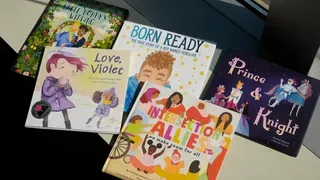February 9, 2011
Civil Unions Measure Advances in Hawaii, While 2 States Talk Marriage Equality
Kilian Melloy READ TIME: 7 MIN.
Hawaii took another step toward civil unions on Feb. 8, when a committee in the state's House of Representatives approved a bill--similar to the one vetoed last year by GOP then-Gov. Linda Lingle--that would grant legal recognition to gay and lesbian families.
Meantime, two states are mulling full-fledged marriage equality--even as lawmakers in two states where marriage is already legal are pushing measures that would strip same-sex families of marriage, in one case going even further and denying them any form of legal recognition whatsoever.
In several other states, lawmakers (and anti-gay organizations) are pushing for constitutional amendments that would put legal marriage rights out of reach for gay and lesbian families.
The Associated Press reported on Feb. 9 that the Hawaii civil unions bill, which recently cleared the state Senate, received the approval of a House committee. The measure is headed to the full House and then, if the House approves it, back to the Senate. If the Senate signs off on adjustments made by the House, the bill will proceed to the desk of Gov. Neil Abercrombie, a Democrat, who has said that he will sign the measure into law.
Last year, a similar bill landed on then-Gov. Linda Lingle's desk, but Lingle, a Republican, vetoed the bill, saying that the issue should be decided by putting the rights of gay and lesbian families up to a vote. "It would be a mistake to allow a decision of this magnitude to be made by one individual or a small group of elected officials," Lingle said.
Civil unions foes condemn the measure as a back-door attempt to introduce marriage equality into the Aloha State, where the Hawaii supreme court ruled in 1993 that denying gay and lesbian families marriage equality was a violation of the state's constitutional guarantees. The verdict sparked a lengthy and contentious debate in the state, and led to a wave of ballot initiatives across the country to amend state constitutions, barring gay and lesbian couples from gaining marriage rights and forestalling similar court decisions.
Hawaii voters eventually approved an amendment to their state's constitution that denied marriage to gay and lesbian families.
Five states currently permit gays and lesbians to marry. So does the District of Columbia. A few states, including New York, honor marriages granted to same-sex families elsewhere, though they do not provide marriage equality themselves. Six states extend an array of rights and protections to same-sex families in the form of civil unions or similar legally recognized relationships.
In one state where marriage parity used to be the legal right of gay and lesbian families, voters narrowly approved a 2008 ballot initiative that snatched that right away. A deeply contentious struggle in California that culminated in the passage of Proposition 8 left 18,000 married same-sex families in limbo until a court decision reaffirmed their legally wed status--unless death or divorce should end those specific unions. Proposition 8 has since been ruled unconstitutional in federal court but depending on how the courts involved in the appeals process--and, in all likelihood, the U.S. Supreme Court--decide, the individuals in those marriages may never again be allowed to marry the person of their own choice.
Another state where marriage equality is currently the law of the land may follow in California's footsteps, but take the curtailing of family rights even further. While California's same-sex families can still access legal recognition and some rights through domestic partnerships, families in Iowa face the possible loss of marriage as well as any form of legal protection--including domestic partnerships and civil unions--if anti-gay lawmakers there succeed in placing a constitutional amendment barring access to those things before the state's voters.
And in New Hampshire, where marriage equality became the law of the land last year, a new Republican majority has taken aim at gay and lesbian families with not one, but two bills designed to revoke family parity. As EDGE reported on Feb. 9, "Republicans won a legislative super-majority in both houses in the Nov. 2010 elections. Observers had believed the GOP would prioritize job creation and reducing the state's budget deficit. They had thought Republicans would have placed any attempt to repeal marriage for same-sex couples on the back burner, at least for this year's legislative session." But anti-gay lawmakers lost no time in setting plans in motion to rescind the rights of same-sex families.
New Hampshire's voters show little interest in rescinding existing rights for their gay and lesbian fellow citizens, however, according to polling data made available on Feb. 9.
Marriage on the Horizon in 2 States?
But marriage equality might also take root in two other states, where lawmakers are considering legislation that would create a place at the matrimonial table for gay and lesbian families.
A House committee in Rhode Island is slated to take up deliberations over a bill that would usher family parity into that state, a Feb. 9 Associated Press article reported. The committee will hear public testimony on the bill starting the afternoon of Feb. 9. Under former Republican Gov. Don Carcieri, similar bills in the past suffered defeat, but newly elected Independent Gov. Lincoln Chafee is a supporter of marriage equality. The bill's sponsor is openly gay House Speaker Gordon Fox.
Maryland's state Senate also heard testimony on a marriage equality bill. Proponents and foes of family parity alike spoke to a committee into the evening on Feb. 8, Maryland news site Gazette.net reported. As in Rhode Island, Maryland lawmakers have considered such legislation before, though to no avail. The bill currently before the Senate committee is co-sponsored by openly gay Sen. Rich Madaleno.
One young woman--Maya, age 14--addressed the committee to say that she and her sister "deserve the same respect and protections that our friends and classmates receive because their parents are married." Added Maya, "We have been waiting for so long. I want my moms to be married."
Support for the measure was not strictly a partisan matter, reported Washington, D.C. GLBT publication MetroWeekly on Feb. 9. Openly gay Republican Chrysovalantis Kefalas told the committee, ''Marriage defines our place in a community.... without marriage there can be no true equality under the law.''
The article said that opposition mostly came from religious organizations, including the Alliance Defense Fund, an anti-gay, faith-based group. A lawyer with the ADF, Austin R. Nimocks, testified that the bill does not offer enough protections to churches and clergy who oppose gay and lesbian families due to their beliefs. Nimocks also suggested that granting legal parity to gay and lesbian families would harm children, saying, "The state of Maryland increases the chances that children will be raised in a stable family unit by a mother and father responsible for bringing them into this world" under existing law, which currently denies protections and rights to same-sex families.
Anti-gay group the National Organization for Marriage, which was a key player in the bitterly divisive campaign to pass Proposition 8 in California, also spoke against the measure, with the group's former president (now Board Chair) Maggie Gallagher telling the committee, "The reason that marriage is a virtually universal human social institution that reoccurs again and again in different cultures, and different religious backgrounds, is that humanity recognizes that we need a special institution to bring together a male and female to make and raise the next generation." Gallagher went on to claim, "To get to gay marriage requires that we repudiate this as a public purpose of marriage."
If marriage equality is granted to same-sex couples in Maryland, Gallagher told the Associated Press in a Feb. 9 article, she anticipates that a voter referendum will kill the new law, as happened in Maine in 2009, when voters repealed a family parity measure before it could take effect.
The prospects for marriage equality's passage in the state are good. A bill similar to that being considered by the Maryland Senate is already before the House. "We know it's going to be a contentious issue in the Senate," said House Speaker Michael E. Busch. "If a bill passes in the Senate, we're going to have to take it up in that form. If it doesn't, that ends the debate."
But Senate President Thomas "Mike" Miller--who does not support marriage equality himself--predicted that the measure would clear the chamber. Miller also pointed to recent gains made by GLBT Americans, including greater acceptance overall and a Congressional vote late last year to rescind the ban on openly gay and lesbian patriots serving in the Armed Forces. "This is a national trend, this is not a state of Maryland trend," said Miller, who also reckoned that the question is "a generational issue." Younger voters tend to favor GLBT legal and social equality.
That trend might eventually reverse the tidal wave of anti-gay constitutional amendments that have locked same-sex families out of legal wedlock in 30 states. The acid test might be the result of legislative attempts in North Carolina, Indiana, and Wyoming to amend the constitutions of those states in a similar manner, the Feb. 9 AP article said. NOM is pushing to help anti-gay lawmakers in those states get the amendments before voters, but there is some hope that as acceptance of gay and lesbian families grows in America, such measures will start to fail at the ballot box--and may one day even be reversed.
It only helps that gay families are more visible in the culture--and that the sky has not fallen in Massachusetts, where marriage equality came into effect seven years ago, or in any of the other states where gay and lesbian families have gained the freedom to walk down the aisle and say their I Dos, noted the Feb. 9 AP article.
"People are realizing, 'Oh, this isn't just a theoretical issue. That's our nice neighbors down the street,' " said Marriage Equality media director Molly McKay. "You can't put the toothpaste back into the tube once it's squeezed."
In Hawaii, public testimony conformed to the issues defined by both sides in other states. Opponent Allen Cardines, Jr., of the Hawaii Family Forum, declared, "Civil unions are a desperate and dishonest attempt to force same-sex marriage on the state of Hawaii." Added Cardines, "They will not stop here with civil unions. They're really looking for same sex marriage. They know it; we know it; the people of Hawaii deserve to know it."
But Waikiki resident Lenny Zimmerman spoke of the love and devotion between himself and his same-sex life partner. "I can't imagine how empty the last 32 years of my life would have been without him, and yet, as far as the state of Hawaii is concerned, we are nothing more than roommates," Zimmerman testified. "I encourage the state of Hawaii to recognize our relationship for what it is. We are a family."
Kilian Melloy serves as EDGE Media Network's Associate Arts Editor and Staff Contributor. His professional memberships include the National Lesbian & Gay Journalists Association, the Boston Online Film Critics Association, The Gay and Lesbian Entertainment Critics Association, and the Boston Theater Critics Association's Elliot Norton Awards Committee.







